LETTERS
























e Greater Praise God is Not Here
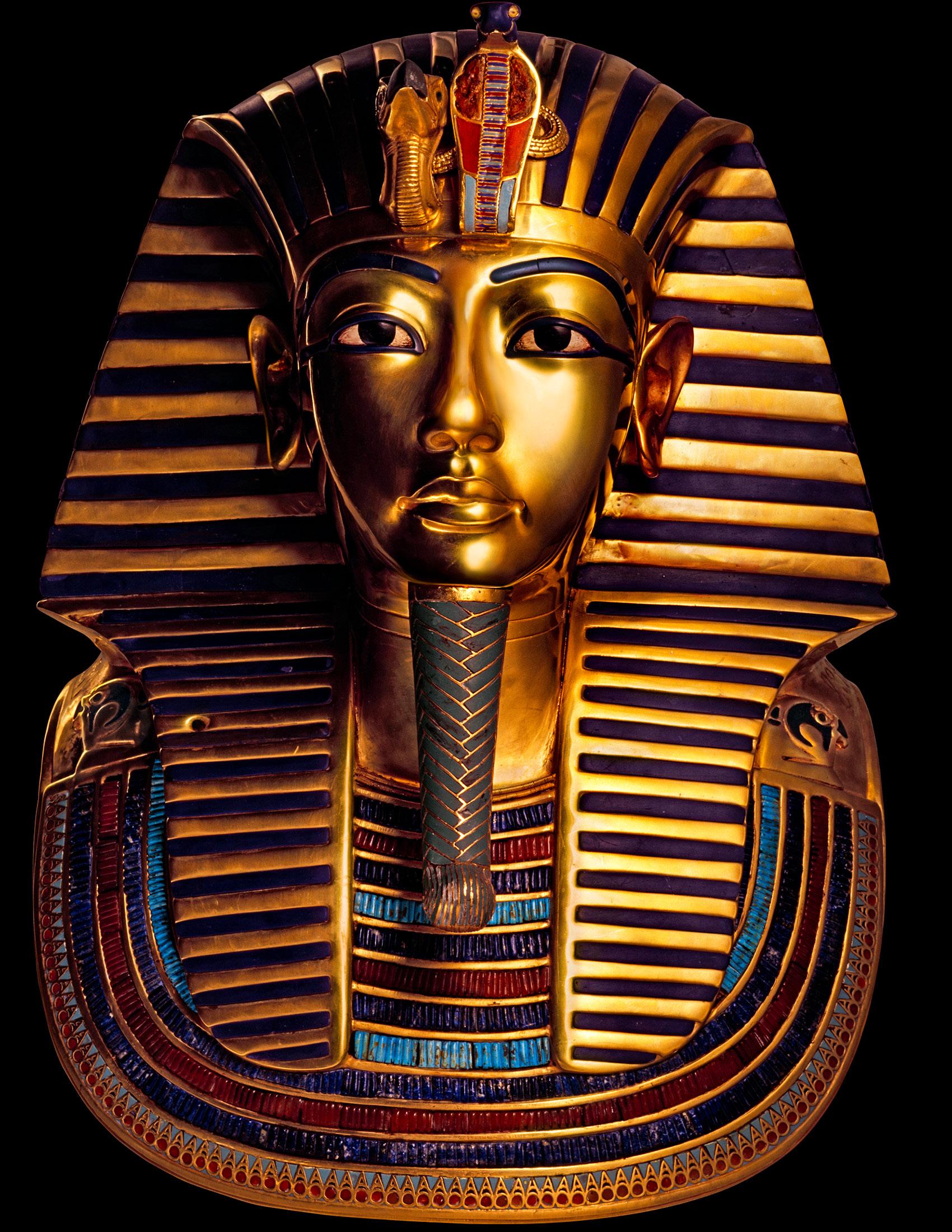
What are we Searching for?
Why Such a Focus on Bread?
WHICH THOUGHTS MATTER?
RABBI REUVEN MANN RABBI MOSHE BEN-CHAIM PASSOVER PASSOVER PASSOVER
FREE
Just click any icon in this issue





2 | WWW.MESORA.ORG APR. 5, 2023
the
THE JOURNAL ON TORAH THOUGHT
| Please send letters and questions to: Comments@Mesora.org |
10 Searching
6 Bread
14 God’s Not Here
MIND & EMOTION
As Rabbi Israel Chait taught, the Jews earned their salvation through the blood of the Paschal sacri ce, and the blood of circumcision. is demonstrated their intellectual perfection by rejecting idolatry (killing the Egyptian animal god) and their control of their instincts through circumcision which reduces sexual pleasure. e Jews earned freedom when they perfected both parts of their personalities.
THOUGHTS
The Greater Praise of God
The Passover Seder focuses on retelling the Egyptian exodus. Matzah, bitter herbs, and the Paschal sacrifice are key elements. The format is to commence our discussion with our degraded history, and conclude with praise to God for our redemption. This contrast engenders deep appreciation for God’s kindness in improving our lives.
There's two versions of “commencing with



degradation and concluding with praise”:
1) At first we were idolaters and we ultimately received Torah;
2) At first we were slaves, and we were ultimately freed.
Yet, when discussing which cups require leaning, it's limited to only the second category of freedom (Pesachim 108a). What happened to the theme of idolaters vs. Torah? This question

Subscriptions are free. To subscribe, send any email to join@mesora.org We invite feedback at comments@mesora.org
Articles may be reprinted without consent of the Jewishtimes or the authors, provided the content is not altered and credits are given. WWW.MESORA.ORG APR. 5, 2023 | 3
RABBI MOSHE BEN-CHAIM Multiple topics are addressed
–––––––––––––––––––––––––
3 Letters
RABBI MOSHE BEN-CHAIM Torah verses clue us in to God’s brilliant plan behind Passover MESORA
RABBI MOSHE BEN-CHAIM
RABBI REUVEN MANN Metaphoric meaning to our Passover searching
RABBI MOSHE BEN-CHAIM Rejecting the view that God exists “inside” the world (CONT. ON NEXT PAGE)
|
|
is strengthened as the true goal of the Exodus was not physical freedom, but our receipt of Torah. Certainly, then, shouldn't there be a cup and leaning designated about our receipt of Torah? But the answer is that “Mitechila”—the paragraph commencing with “At first our forefathers were idolaters”—said over the second cup mentions Joshua who was subsequent to Torah. Dayeinu too discusses Torah as do the many Torah quotes throughout Hagaddah. By citing the Torah verses, we are in fact saying, “At first we were idolaters and we ultimately received Torah.” Quoting Torah versus validates our receipt of Torah.
There's two versions of “commencing with degradation and concluding with praise”:
1) At first we were idolaters and we ultimately received Torah;
2) At first we were slaves, and we were ultimately freed.
Rabbi Israel Chait explained, the question is whether the discussion of the Exodus encompasses only the “facts” of Exodus—our transition from slavery to freedom—or do we discuss the “purpose” of the Exodus: the ultimate receipt of Torah.
Talmud (Pesachim 108a) has another interesting discussion: Do we lean drinking only the first 2 cups which refer to the “beginning” of our redemption, although we are not yet physically freed? Or do we lean only when drinking the last 2 cups commemorating our “freed state”—after leaving Egypt…but during the first 2 cups we cannot lean as we were not yet physically free.
This second view is of the opinion that we are praising God relative to our newly redeemed estate; we are thanking Him for our benefit. However, there is a greater praise we can give to God. It is a praise not relative to us, not relative to anything…but a praise for who God is. This first view says we must praise God for His very being (He has the nature to benefit man). The Adone Olam blessing says this precisely: “Master of the Universe Who reigned before any creature was created. And after all things shall cease to be, the Awesome One will reign alone.” These two statements praise God in a non-relative manner: God’s greatness is inherent and independent of man or anything else. Thus, even before we tasted physical freedom, we lean during the first 2 cups, to celebrate God's nature, His capacity to provide freedom.
The Perfect Rebuke of Idolaters
Jeremiah 8:1,2) includes this rebuke:
“At that time—declares the Lord—the bones of the kings of Judah, of its o cers, of the priests, of the prophets, and of the inhabitants of Jerusalem shall be taken out of their graves and exposed to the sun, the moon, and all the host of heaven which they loved and served and followed, to which they turned and bowed down. They shall not be gathered for reburial; they shall become dung upon the face of the earth.”
The profound lesson here is God’s demonstration that the deities man invented in the heavens, did not protect those idolaters from deaths, as their bones display. The sun, moon and stars, “staring” at these skeletons, have no power to revive them, or return them to the grave. God rejects the deification of the luminaries by saying, in other words, “Let's see if they help you now.”
Similarly, “For that night I will go through the land of Egypt and strike down every firstborn male in the land of Egypt, both human and beast; and I will mete out judgments to all the gods of Egypt, I am God” (Exod. 12:12). Rashi comments that the judgment of the Egyptian gods was the melting of the metal idols, and the rotting of the wooden idols. God exposed the Egyptian deities as defenseless against God. ■
Same Sex Unions


READER: Please address the destruction of Judaism by subversive Leftists. God doesn’t sanction homosexual “marriage,” or the confusion of the two sexes, or any of the perversity going on around us today. Do you have the integrity to address these destructive forces?
RABBI: God has already addressed this: “Do not lie with a male as one lies with a woman; it is an abhorrence” (Lev. 18:22). This formulates the prohibition of male homosexuality. “If a man lies with a male as one lies with a woman, the two of them have done an abhorrent thing; they shall be (CONT. ON NEXT PAGE)
4 | WWW.MESORA.ORG APR. 5, 2023
THOUGHTS SHARE
THOUGHTS
put to death—and they retain the bloodguilt” (Lev. 20:13). This formulates the punishment of male homosexuality. Sexuality targets procreation, and psychological health. God deems heterosexual unions as the healthy, mutually complimentary type, as God said, “It is not good man should be alone” (Gen. 2:18) referring to God's creation of the female, not another male. Thus, same sex unions is not God’s plan. And any deviation from God’s plans must result in consequences. Man and woman are di erent psychologically and are mutually complimentary. This is not so of same-sex unions.


However, the prohibition of homosexuality is a sexual prohibition. For we see some of the highest level relationships between two men, such as David who treasured the love of Jonathan: “I grieve for you, my brother Jonathan, you were most dear to me. Your love was wonderful to me more than the love of women” (Samuel II, 1:26). David and Jonathan’s friendship was built on Torah values which forges a great identity and bond. The perfected person’s greatest value is the life of wisdom and morality, and when he sees this value in another, there's a natural bond to that person. A dear friend of mine, a Torah educator, shared that he feels depressed in the summer when he doesn't see his students. This is the same value. ■
Which Matter?Thoughts
RABBI: When you sacrifice in the temple, if you have a thought to eat it on day three which is prohibited, that nullifies the sacrifice. But if I have a thought to steal from somebody, there is no violation until I actually do the stealing. Why is thought in sacrifice more severe?
READER: Well maybe if you had in mind to eat the sacrifice later, then you aren’t doing the mitzvah with proper knowledge of how to fulfill it, so it disqualifies the sacrifice. But by the stealing all you did was have a thought to rob someone, so that wouldn’t be prohibited.
RABBI: You mean in sacrifice, I'm actually in the process of fulfilling a mitzvah, and I ruined it with a wrong thought. But thought is not considered part of the process of stealing?
READER: Yes.
RABBI: So what if while I am stealing, I have a thought to return the object next week…didn’t I still violate stealing? I would say yes.
Thought has di erent ramifications in di erent laws. Sacrifice is how we relate to God, we kill the animal to demonstrate that our existence is not necessary; we should be without existence just like the animal we just killed. That is why Adam o ered a sacrifice immediately when he was created. He realized he did not exist two moments ago, and wished to demonstrate his realization. But as he saw that God wants him to exist, for God just created him, he could
not kill himself, so he used an animal to demonstrate his existence not necessary. Adam felt, “Just as that animal I sacrificed is now nonexistent, I too do not need to exist. God is the only necessary existence, as God is the only existence that never lacked existence.” But all else need not exist: it’s completely God’s decision.
We cannot underestimate the value of Adam's sacrifice as he was recognizing the most humble and vital realization: we don't exist for ourselves, but we exist to recognize God as creator. So Adam looked at himself as unnecessary existence, and he only exists now to fulfill God's will, to recognize God and study His wisdom. But man's existence is kindness from God, and is not necessary.
Now, as our relationship with God is intellectual, based on ideas, sacrifice to God is a ected by our ideas, where the wrong thought in sacrifice nullifies the sacrifice. Similarly, the wrong thought about God can violate idolatry, even without any action. Thought is the medium through which we relate to God. But as our relationship to man is more in the physical sphere, our thoughts are not as impactful. Therefore, if while I'm stealing, I think about returning the object, that is irrelevant as the physical act is more crucial.
If someone built a 4-wheeled motorized vehicle and called it a Tabernacle, he is wrong as Tabernacle was already defined at its “inception” as a mobile Jewish temple. Calling a religious building a Ford is also wrong, as that vehicle was defined in 1908 at its inception. “Sacrifice” too gets its definition from its inception. To define sacrifice and its purpose, we don't define it based on later models, as later generations didn’t develop sacrifice. Adam was the first one to sacrifice, thereby defining what sacrifice is. Thus, we derive the definition of sacrifice from Adam’s instant acceptance upon his creation that he need not exist, just like this dead beast. Sacrifice’s definition, then, is derived from its inception, only from Adam’s sacrifice.
Yes…we can observe something, and by its design or function we can o er “a” definition of it. We correctly state sacrifice it is meant to recognize God. But this is not its “definition,” because many things can be “meant to recognize God.” A definition is this: a description which is inapplicable to anything else.
Without knowing that Adam was the first one to sacrifice, we miss the crucial essence of sacrifice, and that is Adam’s realization: “Man’s new existence is not necessary.” Only Adam represents that “man” is something new. One could not derive this just by examining a sacrifice today, without Adam part of that picture. To ensure that this crucial definition of sacrifice is not lost, everyone subsequent to Adam sacrificed on the same parcel of ground, from where Adam was created (Maimonides, Hilchos Bais Habechira 2:1). By sacrificing on that same parcel of ground, they permeated sacrifice with Adam’s identity, that man's existence, which was spearheaded with Adam, is as unnecessary as a dead animal. ■
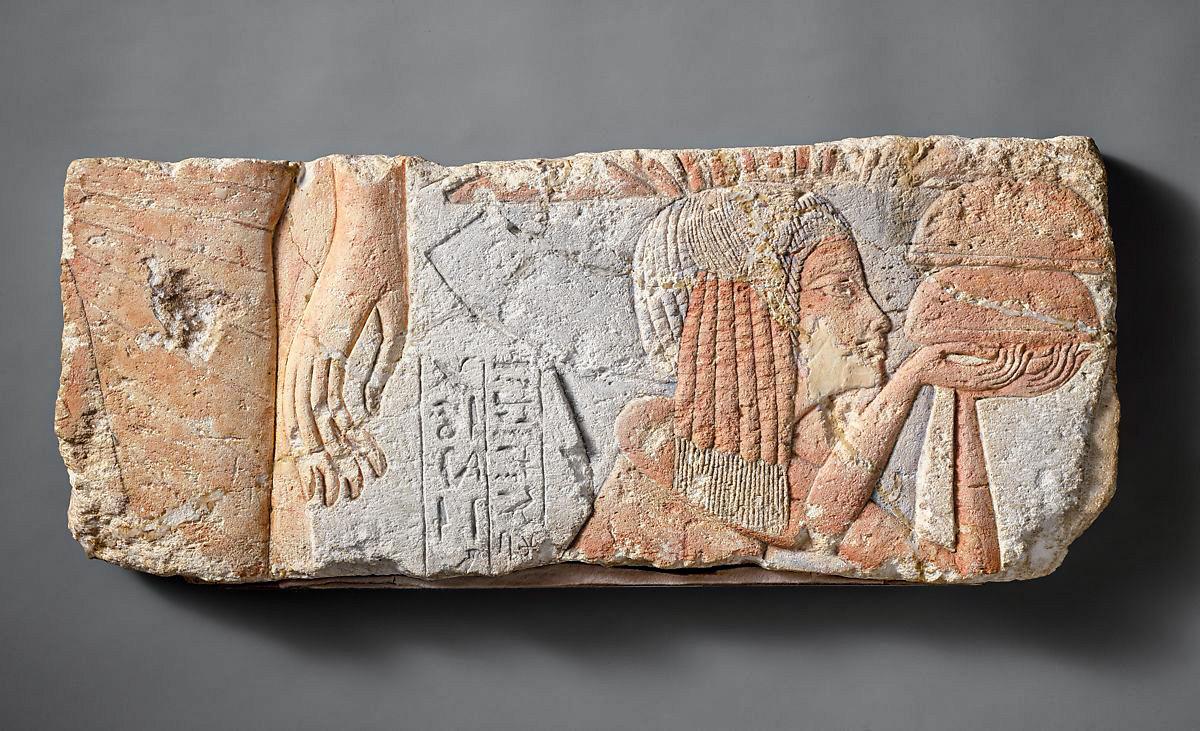
WWW.MESORA.ORG APR. 5, 2023 | 5
Why Such a Focus?
When studying Passover (Exod. 12), we note its distinction from the other holidays: Passover was celebrated in Egypt. That is, its commands existed even prior to the Torah. Today, we reenact those commands in the form of the shank bone, matza, bitter herbs, and other laws. Succos and Shavuos are commemorations of God’s kindness to us. Passover is as well, but it di ers from the other holidays with our pre-Torah Passover observance in Egypt. Additionally, our adherence to God’s commands in Egypt contributed to the holiday’s structure: there is only one Succos holiday and one Shavuos. But there are two Passovers: the Passover of Egypt, and all subsequent Passovers. What may we learn from its distinction from the other two holidays? What di erences exist between the


6 | WWW.MESORA.ORG APR. 5, 2023 SHARE
(CONT. ON NEXT PAGE)
BREAD
RABBI MOSHE BEN-CHAIM
Passover of Egypt, and our Passover?
Reading the Haggadah, we note a conflict in the identity of the matza. The Haggadah commences by describing the matza as “lachma anya”—poor man’s bread. The Jews were fed this bread during their Egyptian bondage. However, later on, the Haggadah, quoting the Talmud Pesachim 116b states that matza is commanded in memory of the dough which did not rise due to the Egyptians’ swift, panic-stricken oust of the Jews. (After the Death of Firstborns, the Egyptians panicked, “We are all dead!”) We are obligated by Torah law to recall God’s swift salvation by eating the matza. The Jews were driven out from the Egyptian city Raamses, and arrived at Succot. When the Jews arrived, they were able to bake that dough only into matza—not bread—for the hastened exodus retarded the leavening process. The matza serves as a barometer of the speed by which God freed the Jews. Was this matza part of God’s orchestrated events? Did God desire this barometer in the form of matza?
We should note at this point that the Jews in Egypt observed only one day of Passover (R. Yossi HaGalili, Jer. Talmud 14a). The Torah laws describing those Jews’ obligation also appear to exclude any restriction of eating leaven. Certainly on the morrow of the Egyptian Passover, the Jews were permitted to eat leaven. Rabbeinu Nissim comments that it was only due to the rush of the Egyptians that their loaves were retarded in their leavening process. Had the Egyptians not rushed them, the Jews would have created bread for there was no prohibition on bread at that point.


But for which reason are we “commanded” in matza? The Haggada text clearly states it is based on the dough which did not rise during the Exodus. Thus, matza demonstrates salvation, the focus of the Passover holiday, posing this serious problem: not only do later generations have the command of eating matza, but the Jews in Egypt were also commanded in eating the Lamb with matza, (and maror). Now, if while still in Egypt, when there was yet no “swift salvation”, why were those Jews commanded in this matza? How can Jews in Egypt, not yet redeemed, commemorate a Redemption, which did not yet happen?! It is true: the Jews ate matza while slaves. However, the Haggada says the “command” of eating matza was only due to the speedy salvation. This implies that the Jews in Egypt who also had the command of
matza, were obligated for the same reason, which is incomprehensible.
The Torah spends much time discussing the dough, and oddly, also refers to it in the singular, “And the people lifted up (carried) HIS loaf from the kneading troughs before it had risen, rolled up in their garments, placed on their shoulders” (Exod. 12:34). “And they baked THE loaf” (Exod. 12:39).” Why this singular reference to numerous loaves? Why so much discussion about the loaf? And why did the Jews “roll up the loaf in their garments, placing on their shoulders”? This is significant, as God records this.
Finally, Rashi praises the Jews for not taking any provisions when they left: “And they baked the loaf they took out of Egypt into cakes of matza, because it did not leaven, because they were driven from Egypt, and they could not tarry, and also provisions they did not make for themselves” (Exod. 12:39). Rashi says the fact they did not take provisions demonstrated their trust that God would provide. If so, why in the very same verse, did the Jews bake the dough? This implies the exact opposite of Rashi’s intent, that the Jews did in fact distrust God! It is startling that a contradiction to Rashi is derived from the very same verse. In order to answer these questions, it is essential to gain some background.
The Egyptians originated bread. The Egyptian taskmasters ate their bread, as their Jewish slaves gaped enviously, breaking their teeth on dry matza, or “poor man’s bread”—a relative term: “poor” is in comparison to something richer. “Poor man’s bread” teaches that there was a “richer bread” in Egypt: soft bread, which the Egyptians enjoyed while feeding their Jewish slaves matza.
Let us now understand Rashi’s comment. He said the Jews were praiseworthy as they did not take food with them upon their exodus. Thereby, they displayed a trust in God’s ability to provide food. But we noted that in the very same verse where Rashi derives praise for the Jews, whom Rashi said took no food, it clearly states they in fact took the loaves! Rashi’s source seems internally contradictory. I would suggest that a new attitude prevailed among the Jews.
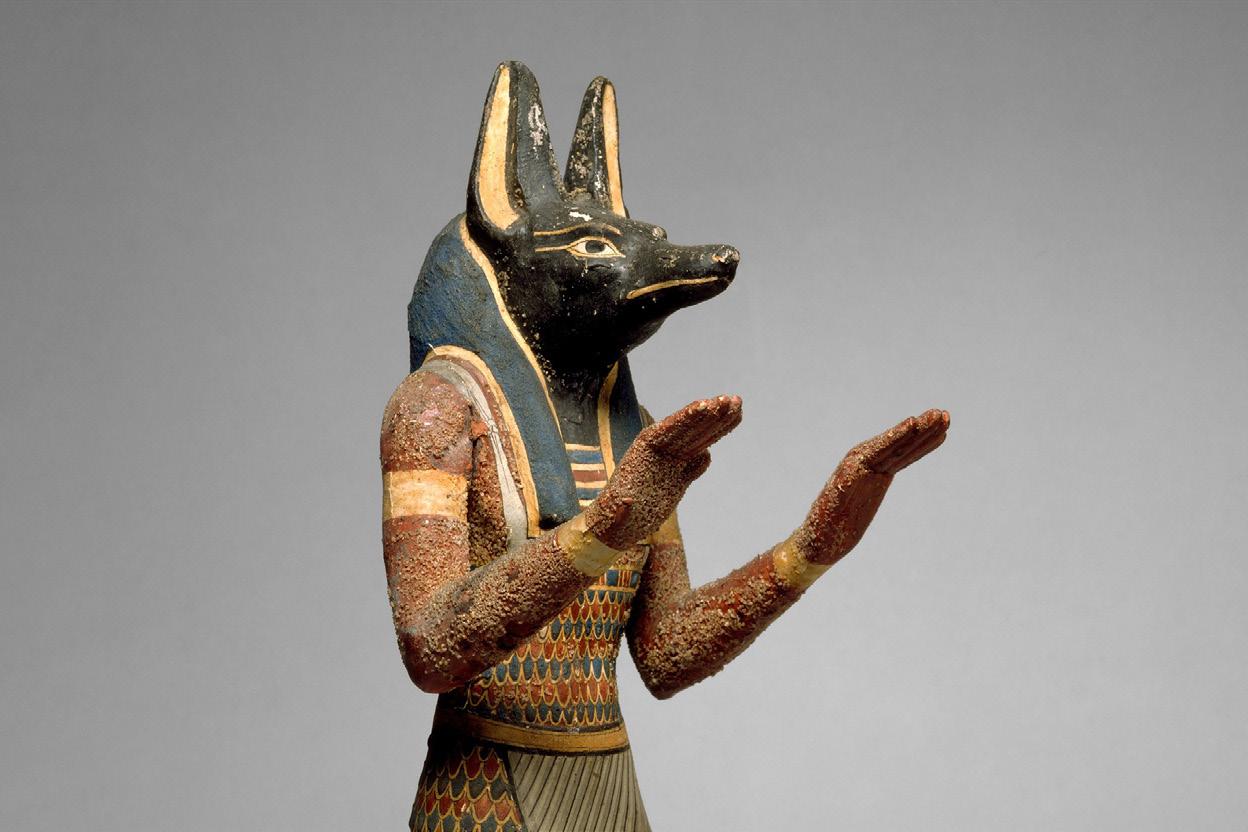
SHARE WWW.MESORA.ORG APR. 5, 2023 | 7
(CONT. ON NEXT PAGE)
PASSOVER
The Significance of Bread
The Jews did not take that loaf from Egypt for the purpose of consumption. This is Rashi’s point. The Jews took the loaf because of what it represented: freedom. They were fed matza for the duration of their 210-year bondage. They were now free. They cherished this freedom and longed to express it. Baking bread instead of dry, poor man’s matza was this expression of freedom. They now wished to be like their previous taskmasters: “bread eaters.” A free people. Baking and eating bread was the very distinction between slave and master in Egypt. The Jews wished to shed their identity as slaves and display their freedom. Baking and eating bread would achieve this. To further prove that the Jews valued such identification with the Egyptians, Rashi comments that when the Jews despoiled the Egyptians at Moses’ command, “they valued the Egyptian clothing more than the silver and gold” (Exodus 12:35).
The Jews’ attachment to bread is made clear in two glaring details: “And the people lifted up (carried)
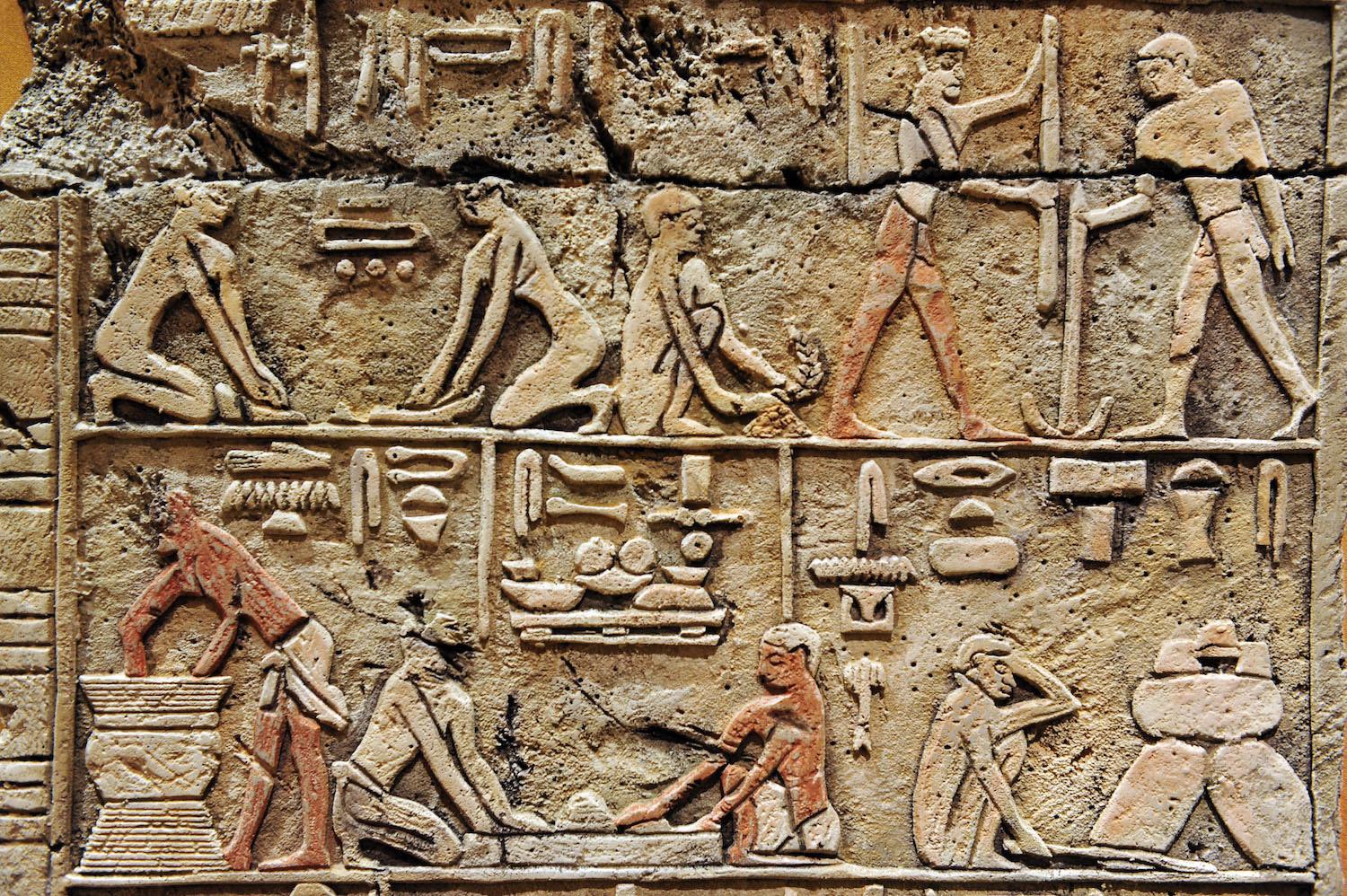
his loaf from the kneading troughs before it had risen, rolled up in their garments, placed on their shoulders” (Exod. 12:34).
The Torah records a strange act: the Jews carried this loaf in their garments, not in a bag or a sack. Additionally, they placed it on their shoulders. “The suit makes the man.” In other words, as clothing is man’s expression of his identity, the Jews placed in their clothes the dough intended to be come free man’s bread. They expressed this link between clothing (identity) and the dough. Furthermore, they carried it on their shoulders, as a badge of sorts. They did not pack the dough away. It was a prized entity they wished to display, forming part of their dress.
Torah records these details as they are significant of the problem God was addressing. “Rolled up in their garments, placed on their shoulders” are intentionally recorded in the Torah to reveal the Jew’s value of bread as a medallion of freedom.
Freedom is Not Inherently Good
However, the Jews had the wrong idea. Their newfound freedom was not intended by God to be unrestricted as they wished to express. They were freed, but for a new purpose: receiving His Torah and following it. Had they been allowed to indulge freedom unrestrained, expressed by eating leavened bread, this would corrupt God’s plan that they serve Him. Freedom and servitude to God are mutually exclusive. Therefore, God did not allow the dough to rise. They trusted God, they saw all the miracles. They needed no food for their journey, as God would provide. But they took the dough in hopes of making that “free man’s food”: leavened bread. The dough was not taken for subsistence, but to symbolize their freedom. They hoped upon reaching their destination, to bake bread, expressing their own idea of freedom. But the verse says the dough only became matza, not their intended leavened end-product. Matza was a mere result of a hurried exodus. Matza was so significant, that the Torah



8 | WWW.MESORA.ORG APR. 5, 2023 (CONT. ON NEXT PAGE) SHARE
PASSOVER
Breadmaking in early Egypt
recorded this “event” of their failed bread making. They planned to bake bread, but it ended up matza. Torah teaches that matza was not the Jews’ plan. It points out through inference that they desired leavened bread. It also teaches that bread was not desired so much for subsistence, as they verse ends, “and provisions they made not for themselves” (Exod. 12:39). They did not prepare food, as they relied on God. This is Rashi’s point. The dough they took was not for provisions; it was to express unrestricted freedom. This unrestricted freedom is a direct contradiction to God’s plan that they serve Him.
The Jews were now excited at the prospect of complete freedom. God’s plan could not tolerate the Jews’ wish. God desired the Jews to go from Egyptian servitude, to another servitude: adherence to God. He did not wish the Jews’ to experience or express unrestricted freedom, as the Jews wished. To demonstrate this, God retarded the dough from leavening. The matza they baked at Succot was not an accident, but God’s purposeful plan, that any expression of unrestricted freedom be thwarted.
One Act: Two Goals
Matza does not only recall God’s swift salvation, but it also represents Egyptian servitude. In the precise activity that the Jews wished to express unrestricted freedom (baking bread), God stepped in with one action serving two major objectives. Causing a swift ousting of the Jews, God did not allow the dough to rise. God did not allow the Jews to enjoy leavened bread, which would embody unrestricted freedom. But even more amazing is that with one action of a speedy redemption, God not only restricted the dough’s process, but God became the Jews’ savior. He replaced the Jews’ intended, unrestricted freedom with the correct purpose of their salvation: to be indebted to God. The one act—God’s swift Exodus—prevented the wrong idea of freedom from being realized, and also instilled in the Jews the right idea: they were now indebted to God, their Savior. They were not left to unrestricted freedom, but were now bound to God by His new act of kindness. An astonishing point.
Gratitude
We return to the command to eat matza in Egypt. Obviously, this command could not commemorate a future event. God commanded them to eat the matza for what it did represent: servitude. While in Egypt, why did God wish the Jews to be mindful of servitude? Here I feel we arrive at another basic theme of the Passover holiday: contrast between servitude and freedom. In Pesachim 116a, the Talmud records a mishna, which states that our transmission of the Haggadah must commence with our degradation, and conclude with praise. We therefore discuss our servitude or our ancestor’s idolatrous practices, and conclude with our salvation and praise for God. We do this, as such a contrast engenders a true appreciation for God’s salvation. Perhaps also the two Passover holidays—in Egypt and today—embody this
concept of our salvation. A central goal of Passover is to arrive at an appreciation for God’s redemption. A contrast between our Egyptian Passover and today’s Passover best engender such appreciation. It compares our previous bondage to our current freedom. Perhaps for this reason we are also commanded to view ourselves as if we left Egypt.
So, in Egypt, we ate matza representing Egyptian servitude. Today we eat it as the Haggadah says, to recall the swift salvation, which retarded the leavening process, creating matza. We end up with a comparison between Passover of Egypt, and today’s Passover: servitude versus salvation. The emergence of the Jewish people was on Passover. We have two Passovers, displaying the concept of a transition, a before and an after.
An interesting and subtle point is that God mimicked the matza of servitude. He orchestrated the salvation around matza. Why? Perhaps as matza in its original form in Egypt embodied servitude, God wished that servitude be the continued theme of Passover. He therefore centered the salvation on the dough, which eventuated in matza; thereby teaching that we are to be slaves to God: “You are my slaves” (Lev. 25:55). Torah clearly views man’s relationship to God as a servant. With this understanding of the significance of leavened bread, we understand why the Torah refers to all the Jews’ loaves in the singular. The Jews shared one common desire: to express their freedom by eating what their free oppressors ate. However, contrary to human feelings, “unrestricted freedom” is an evil…odd as it sounds. God’s plan in creating man was to direct us all in understanding and delighting in the truth of God, His role as the exclusive Creator, the One who manages man’s a airs, and Who is omnipotent (Ramban, Exod. 13:16). God had a purpose in creating man, and it is not to be free and live as we wish (Deut. 29:18 rebukes those who do). Our purpose is to engage the one faculty granted to us and no other creation: our intellect. And the primary use of the intellect is forfeited when we do not recognize God, as the Egyptians displayed. Therefore, God freed us so we may enter a new servitude: serving Him. But this service of God should not be viewed as a negative, as in serving man. Serving God is achieved by studying Him, His Torah and creation: a truly happy and beautiful life. We could equate the enjoyment and benefit in serving God to serving a human master who gives us gold if we simply look for it. So too is the service of God. If we merely learn and seek new ideas, He will open new vaults of wisdom. We are so fortunate.
Finally, what is the significance of chametz, leaven?
Once leavened bread took on the role of freedom with no connection to God, leaven thereby took on a character that opposes the very salvation, demonstrated by the matza. This explains that leaven was not mentioned in connection with the instructions pertaining to the original Egyptian Paschal lamb. The Jews had not yet displayed any attachment to bread. Only subsequent to the first Passover celebration do we see the Jews’ problematic tie to leavened bread. Therefore, only afterwards is there any prohibition on bread. ■


WWW.MESORA.ORG APR. 5, 2023 | 9 SHARE
PASSOVER
What Are We Searching For?
Rabbi Reuven Mann
Our great teacher, Rabbi Joseph Soloveitchik, pointed out that this week’s Parsha, Tzav, is always read prior to Chag HaPesach. Similarly, BaMidbar is always read before the holiday of Shavuot, VaEtchanan after Tisha BeAv and Nitzavim before Rosh HaShana.
The question arises; what is the relevance of these Torah portions to the holidays with which they are associated? The Rav posited that there are two themes in Tzav that are germane to Pesach. The first is that of the purging of vessels that have become “unclean.”
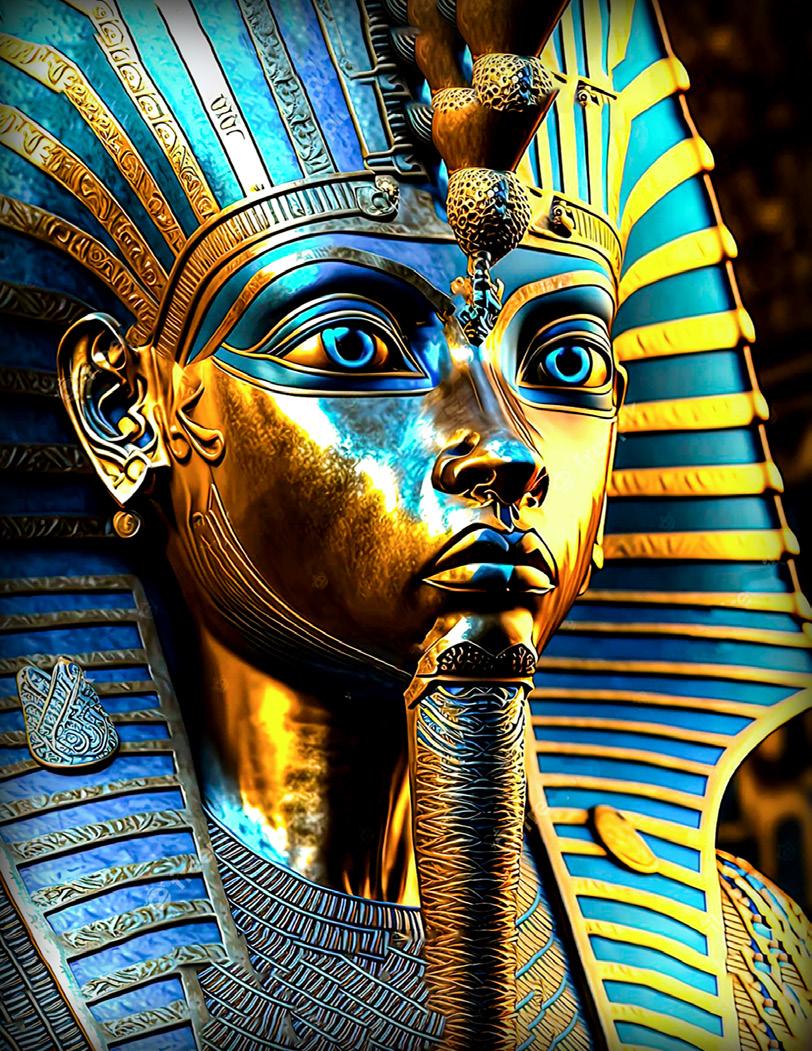
Judaism maintains that one cannot cook foods in kitchenware that have been used for non-Kosher products. Similarly, a pot in which dairy foods were cooked cannot be used to cook meat products and vice versa. This is because of the Halachik concept of absorption; which means that when subjected to heat, food products become embedded within the walls of the metal containers they are in and must be cleansed of that property before they can be used for the preparation of other dishes.
This law is very relevant to Passover, when one must keep a healthy distance from any ingredients that contain Chametz. Therefore, one may not cook foods intended for Passover in any vessels which have been used during the year–unless one is certain that only non-Chametz ingredients have been prepared in those pots and pans.
Is there any way that these Chametz vessels can be used for Passover? Today this question may be impractical since most Jewish families have separate cooking materials which are used only on Pesach. However, there are still some of our brethren who cannot a ord even that luxury. The law of Kashering enables them to render all the cutlery and other needed vessels kosher for Passover use.

1 0 | WWW.MESORA.ORG APR. 5, 2023 (CONT. ON NEXT PAGE) SHARE PASSOVER
While the process of Kashering vessels is purely a Halachik one, I believe that we can find philosophical meaning with it as well. The concept of absorption has relevance to the moral spectrum of our lives. We are subjected to all of the ideas and values of the society we live in, and we should not underestimate the impact this has on our minds and souls.
To a significant extent, the culture of contemporary America (and Israel, as well) is rooted in a hedonistic outlook which views the pursuit of “pleasure” as the greatest good. The attitudes of the society toward crucial matters of morality such as same-sex marriage, abortion, gender transformation and so forth, are clearly contrary to the teachings of Torah. (Unless you are among those whose cleverness is so great that it enables them to reinterpret matters in such a way that everything you thought was prohibited actually is permitted–and even laudable. My we’ve come a long way.)
There is no question that the freedom we have been granted and the cultural assimilation we have experienced have had an e ect on our religious attitudes. Most specifically, this can cause us to question many ideals of Torah and to doubt their veracity. It is therefore important to ascertain if any of the distorted ideas of the culture have been absorbed into our consciousness.
The Jews in Egypt did not only have to worry about cleansing their food processing equipment. Matters were much more serious than that. They had experienced severe religious assimilation and were guilty of worshipping the deities of Egypt.
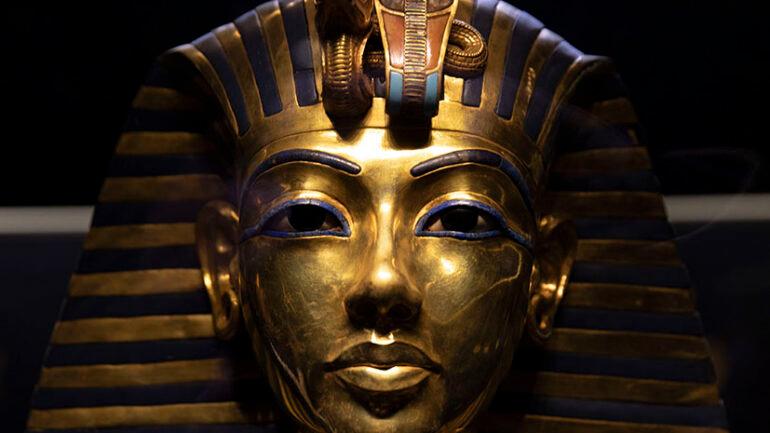
According to the Rambam,
“When the Jews extended their stay in Egypt, however, they learned from the Egyptians’ deeds and began worshiping the stars as they did, with the exception of the tribe of Levi, who clung to the Mitzvot of the Patriarchs–the tribe of Levi never served false gods. Within a short time the fundamental principle that Abraham had planted would have been uprooted, and the descendants of Jacob would have returned to the errors of the world and their crookedness. Because of God’s love for us, and to uphold the oath He made to Abraham, our Patriarch, He brought forth Moses, our teacher, the master of all prophets, and assigned him. Once Moses prophesied and Hashem chose Israel as His inheritance, He crowned them with commandments and informed them of the path to serve Him; and what would be the judgement for those who worship idols and for those who stray after it.” (Rambam Laws of Idolatry 1:3)
This corresponds to the teaching of the Rabbis that in Egypt the Jews descended to the forty-ninth level of Tumah (spiritual impurity) just before the redemption. However, Judaism does not believe that man is a hopeless creature who can’t purify himself. It is firmly rooted in the idea that with Torah study and the practice of Mitzvot and righteous deeds, even the worst sinner can become a genuine servant of Hashem.
Parshat Tzav reminds us that as we search diligently for any particles of Chametz we should also investigate whether any traces of false religious ideology have found their way into our Hashkafa (philosophical outlook). We should seek at this time to purge our premises and utensils of Chametz and our souls of corrupt ideologies. May we merit to serve Hashem according to the truth of His Torah.
Cha
Kashare v’Sameach ■
SHARE
WWW.MESORA.ORG APR. 5, 2023 | 1 1
What is the purpose of gematria?

Can we truly learn anything from the numerical representation of words?
What is beneath these creative yet apparently simplistic interpretations?
While jointly pursuing semichah and a PhD in mathematics, it seemed natural for Elie Feder to love gematria. However, he was bothered by these compelling questions. That is, until he discovered the purpose of gematria.
Gematria Refigured presents the discoveries that led to the author’s transformation from a gematria skeptic to a gematria lover. It develops a theory which elucidates how the Torah and Chazal use gematria to direct us toward a very specific type of idea. Through its many examples, this work illustrates how gematria can help us uncover novel insights, while providing interesting and clearly formulated perspectives into many mitzvos, themes, and stories in Tanach.
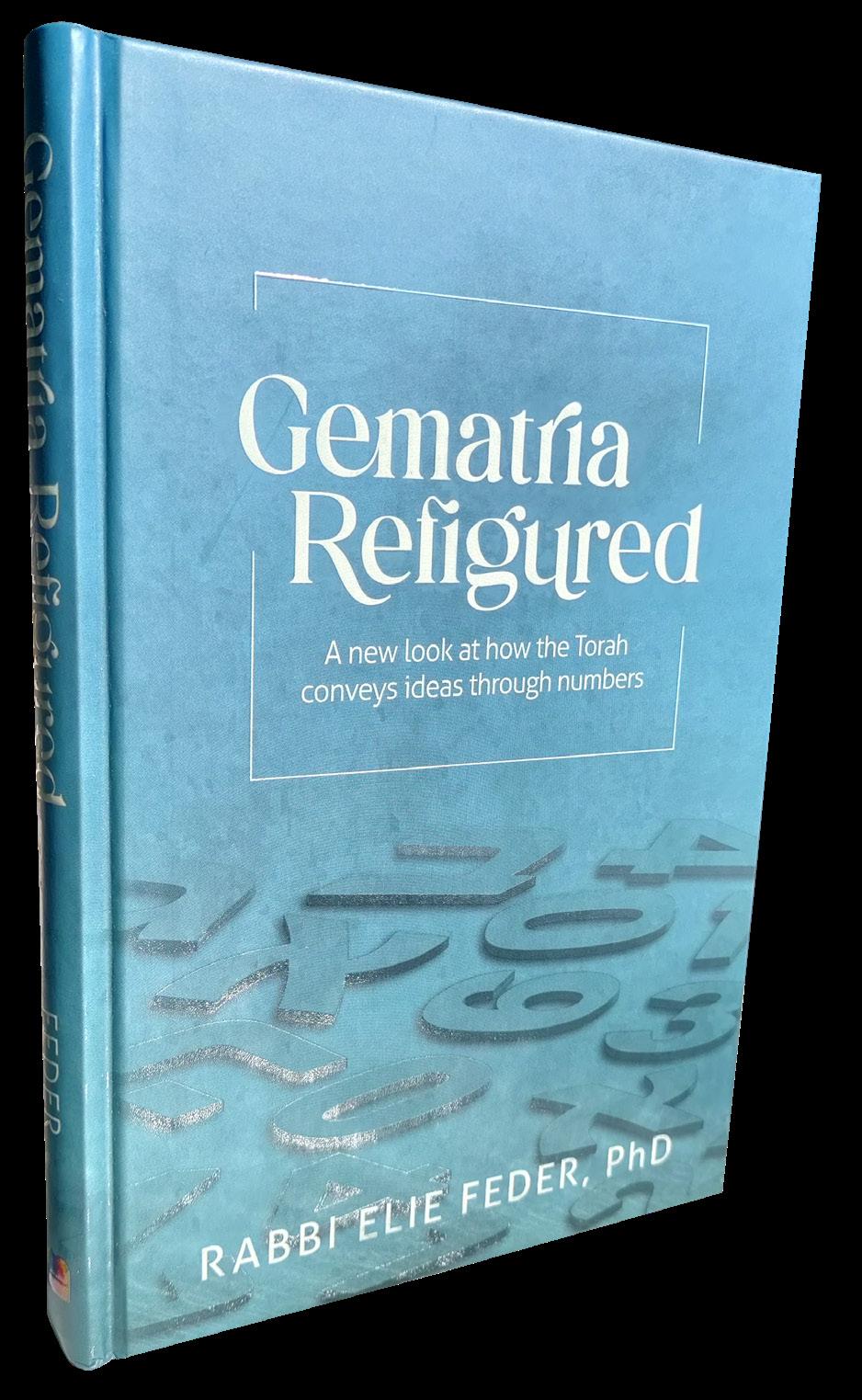
Buy on Amazon

1 2 | WWW.MESORA.ORG APR. 5, 2023
Gematria is a polarizing topic. While many love it, many others view it with skepticism.

WWW.MESORA.ORG APR. 5, 2023 | 1 3 SHARE Designers of the Jewishtimes & Mesora.org Building loyalty and sales through design strategies 516.569.8888 NYDesign.com Branding UI/App Design Wires/Prototypes App Store Design Dataviz/Charts Infographics Iconography Illustration Websites Landing Pages Editorial Design Presentations Social Media Advtg/Promo Animation Packaging
God is Not Here
reader responded to the last Jewishtimes issue which rejected the heretical notion of “tzimtzum”: God contracted His size to allow room for their universe to be created. The Jewishtimes article rejected any relationship between God and physicality: He has no location or size. As God preceded the physical world—space and matter—God exists non-physically. His existence does not occupy space, and certainly not “all space,” as mystics believe, which refutes the need for God to “shrink” so matter can exist. Our edited dialogue follows…

“Immanence” and “Transcendence” are Kabbalistic terms. How does God interface with us in our world? In our Kedusha prayer we say “Holy, holy, holy, God of hosts fills the entire world.” What exactly does this mean? As you rightly say, God has no parts. If so, if God fills the world with His Glory, then it is not just a part of Him (His Glory) that fills the world.
“God of hosts fills the entire” world is metaphoric, but you understand it literally, which is
He is indivisible and therefore He is entirely present and within everything and every aspect of our world. He is therefore entirely “Immanent.”
Your misunderstanding of “fill” forces a metaphysical God into physical space. Heresy.
However, this is not the whole story. The next line of our Kedusha prayer says, Blessed is God from his place.” We now seem to state something entirely contradictory to the first line of the Kedusha. We now talk about God’s Glory, not filling our world, but rather that it is elsewhere, in his “Makom/place,” a place that is not within this world, but rather one that is outside of this world. It “transcends” this world. The Kedusha prayer is describing a basic understanding of our Faith –that our understanding of God is that He is somehow both within everything in this world and at the very same time is also outside everything in this world and abstracted from it. In philosophical language this is called “panentheism” (not to be confused with pantheism).
JEWISHTIMES: You write, “God is somehow both within everything in this world and at the very same time is also outside everything in this world.”
It is heretical to say that God “fills the world” and is also “outside the world” as those both terms treat God spatially.
God’s evidence is seen in nature’s brilliance, explaining “He fills the world” metaphorically: His wisdom is evidenced everywhere. But He is not “in” the world.
1 4 | WWW.MESORA.ORG APR. 5, 2023 SHARE
ON
PAGE)
(CONT.
NEXT
Rabbi Moshe Ben-Chaim
For only that which is physical, having substance, size and location can be “in” the spatial world.

“Blessed is God from His place” means we don’t know how He exists; His “place” is to be understood as, “God is the place of the world, but the world is not His place” (Gen. Rabbah 68).” This means that God is the cause (place) of the world, and that the physical world it’s not the nature of His existence, so He cannot be “in” the universe…the universe is not His nature (place) of existence.
This is Judaism’s’ Fundamental: Since God, and how He relates to the world are not physical phenomena, and since man can perceive only that which is physical (via senses), man is completely ignorant of God, and how He operates: “For man cannot know Me while alive” (Exod. 33:20).
The only knowledge man possesses in relationship to God is what God communicated through Torah and His prophets, and what man can derive through study of the universe. But knowledge of God Himself, and how He creates and maintains His creations, is unrelated to human senses and impossible to grasp by humans, without God telling us.
Torah does not discuss what God is, how He creates, or how He interacts with the physical world, for that’s not God’s intended study for humans. Torah actually says that God is unknowable and incomparable (Isaiah 40:18,25). Positive statements about what God is, or how He interacts with the physical world, are matters of which man is completely ignorant. And if someone
wishes to discuss matters of the chariot (maaseh mercavah), this is prohibited in public discussion (Chagiga 11b).
The greatest man—Moses—discussed proper ethics, morality, and mitzvos like tefillin and tzitzis. He taught of sacrifices, kindness, justice, courts, charity, reward and punishment and the foolishness of mysticism. Tanach elaborates on these topics, and does not share stories of prophets discussing imaginary sephirot, God’s “immanence,” “transcendence” and other imaginary notions. It is clear that God wishes man to focus on these topics that Tanach addresses, and not imagination.
Again, God tells us “To what then, can you liken Me; to whom can I be compared?” (Isaiah 40:25). Talking about what God is and how He interacts (immanence, transcendence) contradicts this verse. Dividing God into parts (sephirot: Yesod, Binah, Malkuth, Ein Sof, etc.) also contradict Rambam’s 13 Principles that God has no parts.
READER: Tzimtzum is the mechanism through which an infinite God creates and interfaces with a finite world. Another equally valid definition of Tzimtzum: Tzimtzum is the mechanism through which God conceals His Presence through His creation of the world.
JEWISHTIMES:You suggest how God operates, when God has not said this. These are baseless assumptions. God exists, the world and Torah prove that. But He is not “here”…He is not “in” anything or anywhere. King Solomon said, “But will God really dwell on earth? Even the heavens to their uttermost reaches cannot contain You, how much less this House that I have built!” (Kings I, 8:27)
Follow God and his Prophets. Not mystics. ■
WWW.MESORA.ORG APR. 5, 2023 | 1 5 SHARE
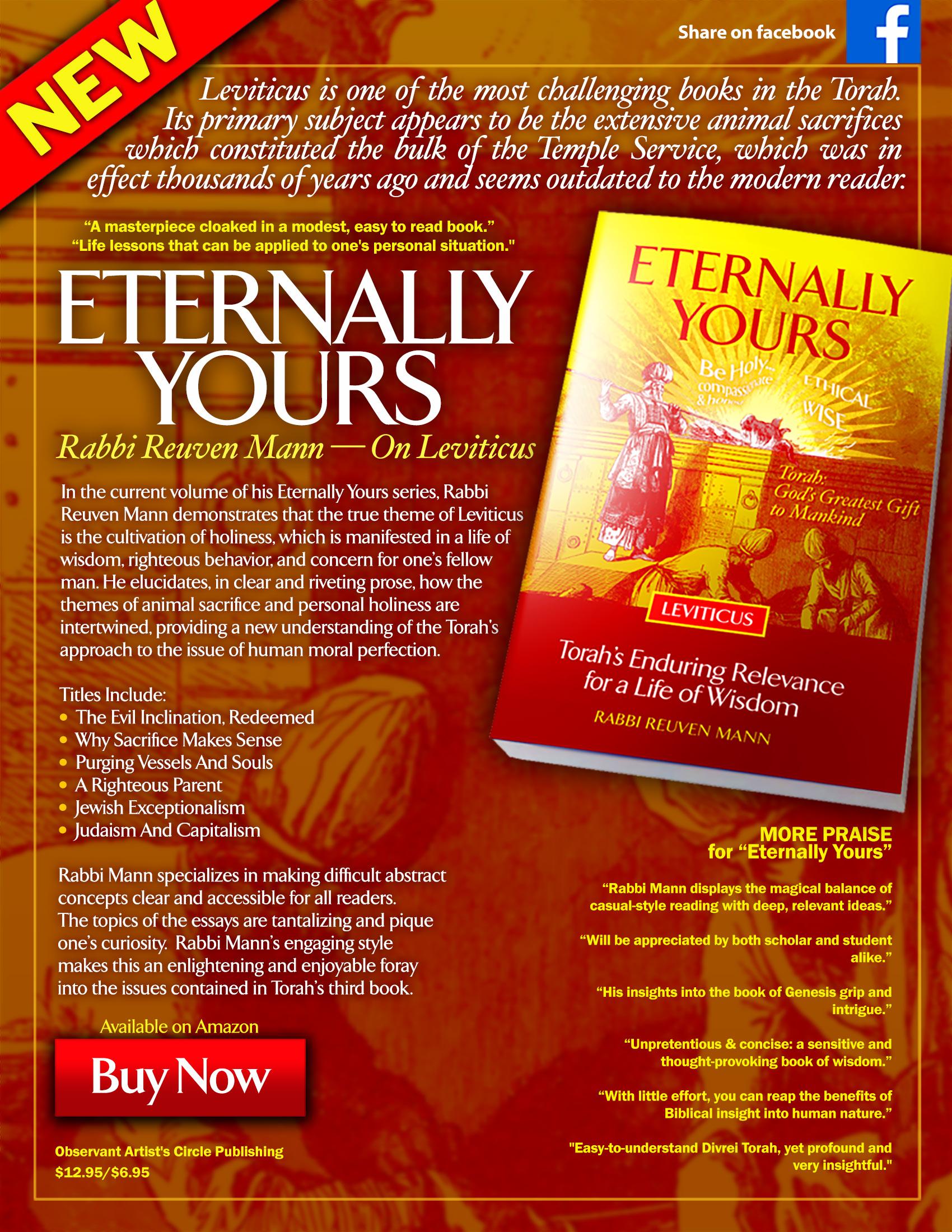
Discover a side of the Bible you never knew existed. Here is a fresh perspective on some of the most lurid, perplexing, and downright fascinating tales in the Bible – stories that are often skipped over in school because they are so di cult to teach. Delve into lesser known details of David and Batsheba's a air. The shocking relationship between Lot and his daughters. Tamar's scandalous seduction of her father-in-law. The tumultuous love a air between Samson and Delilah. But this is not a sensationalized retelling of ancient myths. It is a critical analysis of these narratives through a contemporary lens, weaving together extensive knowledge of tradition and scholarship with a touch of humor.
Challenge your assumptions about what the Bible is and what it has to o er. Don't miss out on the stories that teachers were too afraid to tell you.



Kindle, hardcover and paperback formats. Click below:
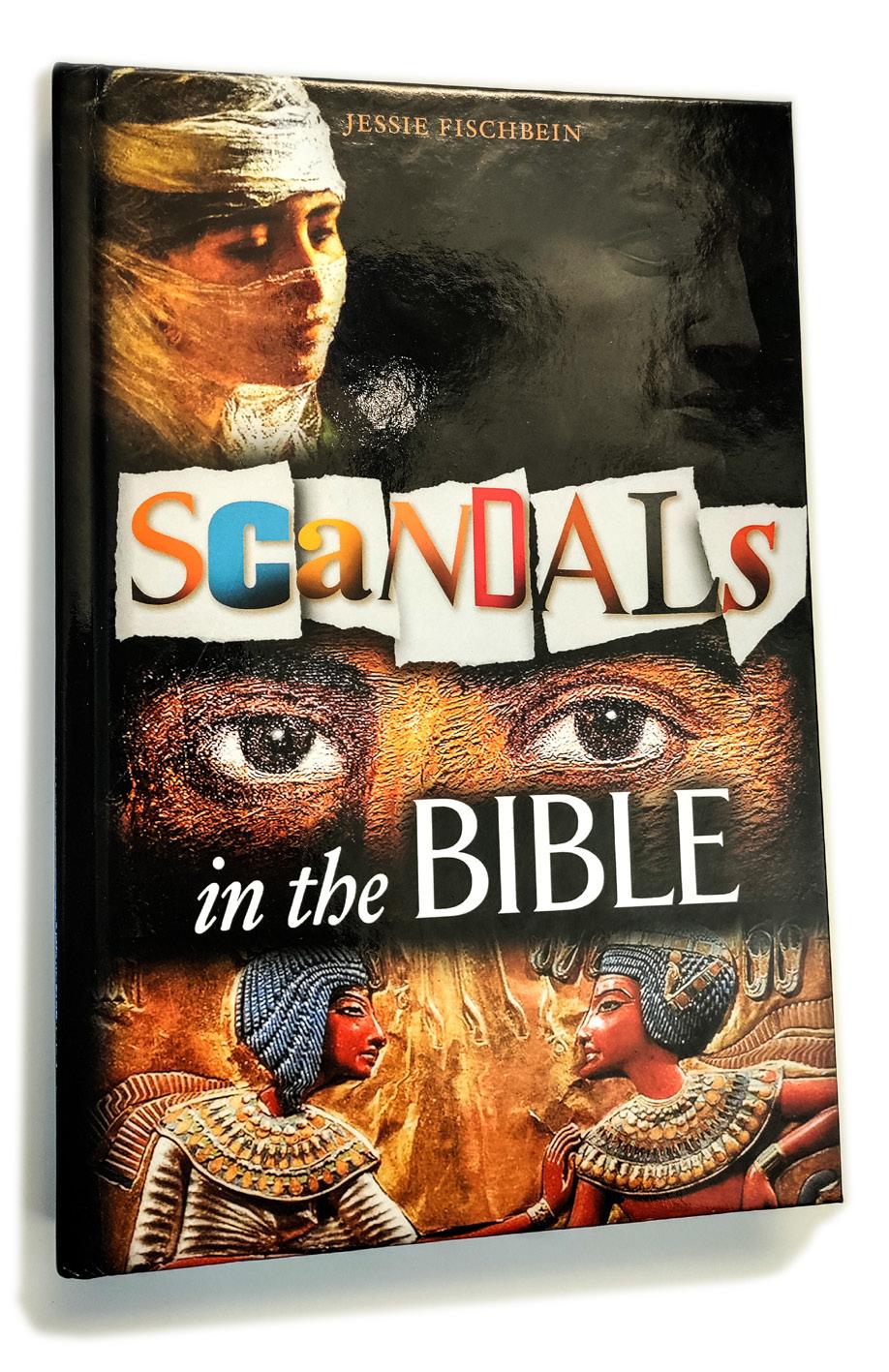
Buy on Amazon
WWW.MESORA.ORG APR. 5, 2023 | 1 7
NEW BOOK:
by JESSIE FISCHBEIN
Jessie Fischbein has a great fondness for the nuances in Biblical text and commentaries. She lives with her husband and children in Far Rockaway, within walking distance of her grandchildren and a beautiful beach, which she visits often. She also loves doing backflips and handsprings.


1 8 | WWW.MESORA.ORG APR. 5, 2023 WORRIED? ABOUT YOUR BUSINESS, YOUR CHILDREN? WWW.FAPS.COM 800-258-8028 FIRST ALLIANCE PROTECTION SYSTEMS REMOTE MONITOR YOUR HOME OR BUSINESS FROM YOUR SMARTPHONE OR PC: • VIEW MULTIPLE LOCATIONS. • LIVE / RECORDED FOOTAGE. • AFFORDABLE PEACE OF MIND. • FROM A LEADER. FREE DEMO...
2 MUST READS THIS SPRING
Tohar Hayihud is a masterpiece of intelligent Torah thought. The Rabbi cites authentic Torah sources, Rishonim and great minds who, over the centuries, have rejected Kabbala’s claims as contrary to Torah.
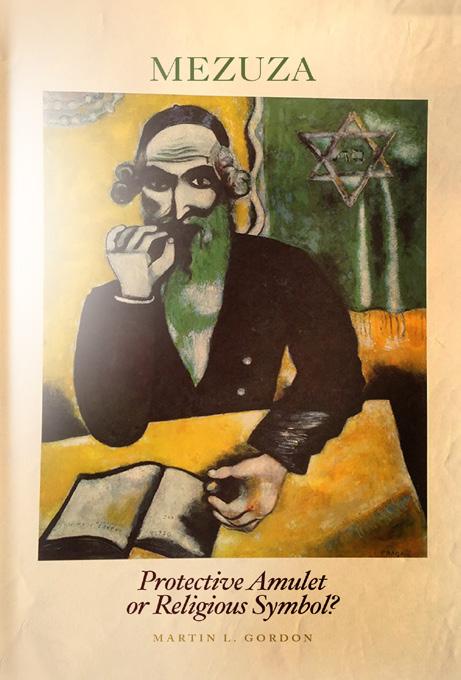
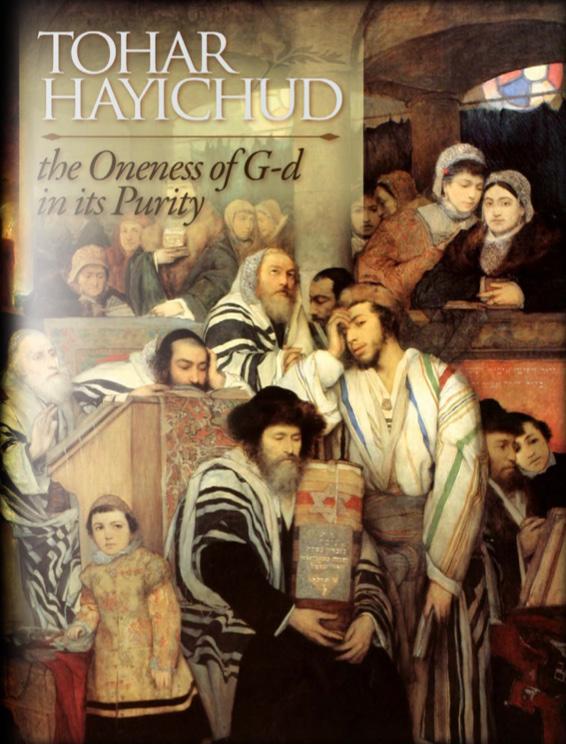
Free to download: www.mesora.org/toharhayihud.pdf
Mezuzah: Protective Amulet or Religious Symbol? addresses the popular belief in segulahs and protective devices. Martin L. Gordon refers to Torah and reason as the authorities on true Jewish concepts.
Free to download: www.mesora.org/mezuza-gordon.pdf
MESORA

WWW.MESORA.ORG APR. 5, 2023 | 1 9
FUNDAMENTALS
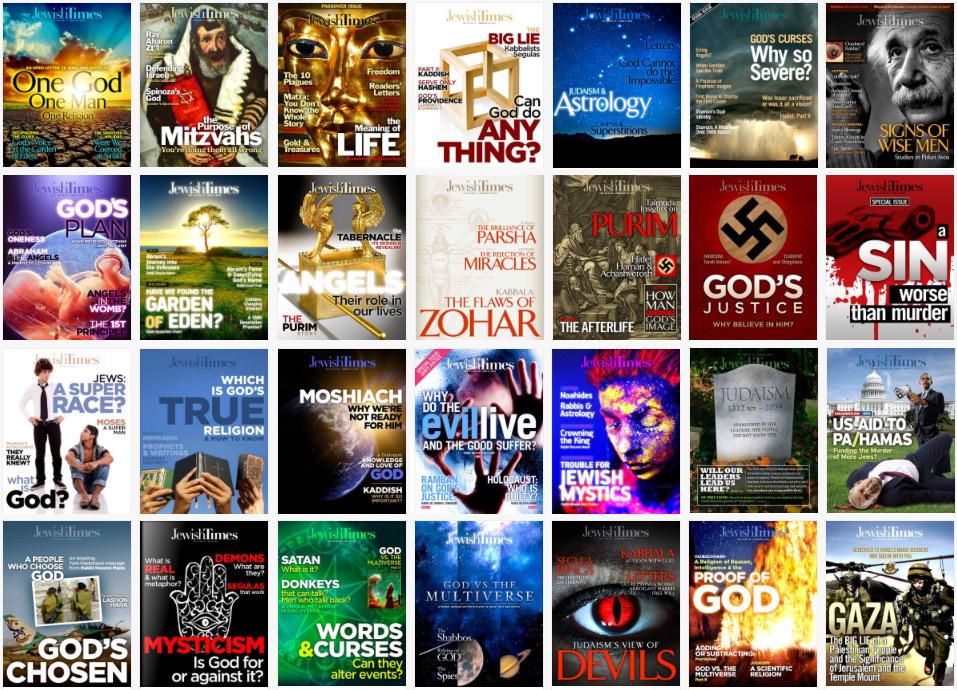
Thought-provoking articles on Torah, Israel, science, politics and readers’ letters. 25 Years. 635 Issues Share a FREE subscription. Click icon below: SHARE 2 0 | WWW.MESORA.ORG APR. 5, 2023




















































